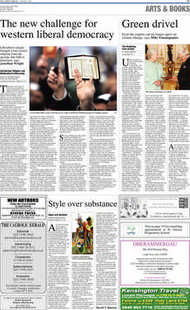Page 13, 6th March 2009
Page 13

Report an error
Noticed an error on this page?If you've noticed an error in this article please click here to report it.
Tags
Share
Related articles
Don’t Bully The Faithful Into Buying Fairtrade
Taking Up The Cudgels For Poor Producers
Cafod Goes Bananas For Caribbean Fair Trade
The Ethical Caffeine High
Coffee Receives Fairtrade Mark
Fairtrade helps consumers make a real difference to the lives of poor producers
From the chief executive of Traidcraft SIR – Prof Philip Booth is right in saying Christians should not be obliged to, or bullied into buying Fairtrade products (Comment, February 20). But he is also right when he says we all must take the Church’s social teaching very seriously.
We are all consumers and consumption involves moral choices. For Christians, of whatever denomination, those choices will be informed by their understanding of the Gospel imperatives to love and serve the world, preferring self-sacrifice to self-interest, generosity of spirit to hardness of heart.
He is also right when he says Fairtrade does not have a monopoly of virtue. We have never claimed it. Unfortunately, in his critique of the way in which the Fairtrade Mark is awarded to products, Prof Booth hasn’t fully grasped the processes involved, but we’ll leave that aside for now. The process is rigorous, lengthy and, yes, costly – as it needs to be if the consumer is to have any confidence in the guarantees of fair reward, working conditions and social benefit which attach to it. An accreditation which is freely bestowed and lacks robust standards is likely to fail at the first challenge.
Rather unfairly, Prof Booth goes on to dismiss the entire Fairtrade School initiative on the basis of one piece of homework which he finds questionable – but then excuses the behaviour of multinationals by accusing the fair trade movement of “generalising from particular examples of abuse”.
And he makes the case for us when he acknowledges that “fair trade’s strongest card is that it goes into markets where there is little information, where primary producers can be, and often are, exploited and makes sure that they get a just market price. It also provides sources of credit and forward pricing agreements that might not be available.” Precisely.
He is equally correct in his assertion that “ultimately poor producers of primary products need wider and better economic opportunities that can only come from development based on the rule of law, secure property rights and a free economy”. Which is why Traidcraft, through its trading company and its charity, is working hard to provide those opportunities, to defend the property rights of indigenous artisans, and to keep the economies of developing countries free from the devastating consequences of trade agreements engineered to allow unfettered access to their markets for the hugely subsidised industries and agriculture of the EU and US.
Prof Booth is, of course, entitled to his view – but he must accept that it is rejected by increasing numbers of consumers, inside and outside the Church, who see their everyday purchases making a real difference to the lives of people they will never know and never meet on the other side of the planet.
And, at a time when the deficiencies of the prevailing economic model have never been more apparent, it seems curious, if not perverse, of Prof Booth to attack an approach to trade which is delivering clear and identifiable benefits to hundreds of thousands of poor producers, defending their livelihoods, extending their opportunities and modelling an approach to business and the conduct of trade founded on solid Christian principles.
Buying fair trade has never been a matter of coercion – it’s a matter of conscience.
Your faithfully, PAUL CHANDLER By email
blog comments powered by Disqus





















